Thick, strong, and healthy hair is one of the most desirable physical attributes for both men and women, and vitamins for hair growth can help you achieve this.
Like hair loss treatments, taking a supplement for hair growth can help the strength, thickness, and sheen of your hair follicles really stand out.
A number of compounds, like biotin, pantothenic acid, and the B vitamins have some solid science backing up their use as hair growth supplements.
Our research team looked at what supplements combine these and other ingredients in the most effective way to determine the ten best supplements for hair growth and hair health.
Research
Rankings
1. Essential Elements Hair Hero
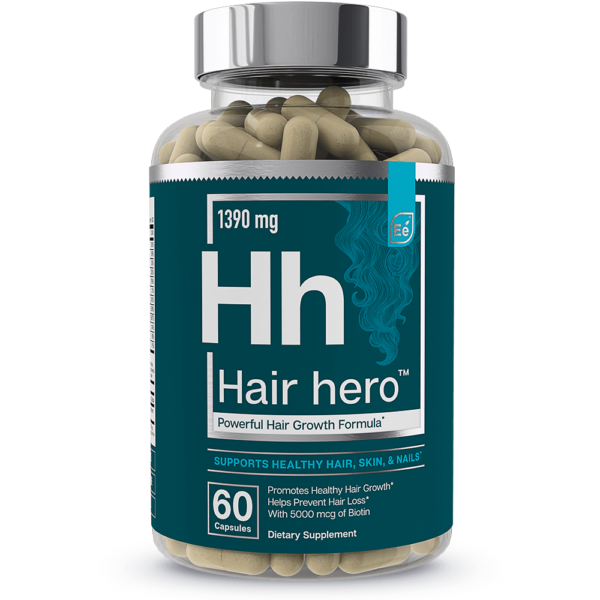
For those who are serious about strengthening their hair, Hair Hero by Essential elements is the best available. It combines powerful ingredients like collagen, horsetail and bamboo extract to repair damaged follicles, alongside biotin and saw palmetto to maximize growth and count.
12 essential vitamins and minerals, including zinc and iron are also added to improve overall body health, making it that much easier to see results. With no GMOs, gluten or preservatives, this is the BodyNutrition’s clear winner for the best hair vitamins of 2021.
2. Hair La Vie Clinical Formula
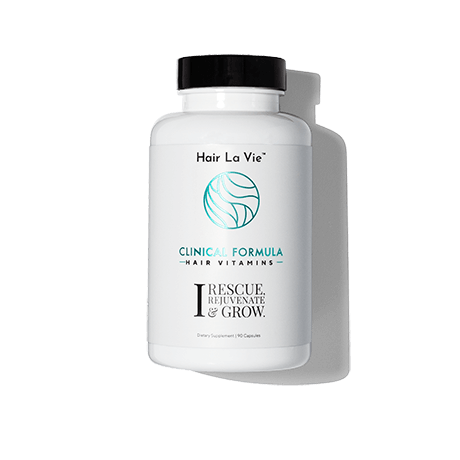
Hair La Vie Clinical Formula contains a proprietary blend of 20 clinically-studied natural ingredients, including reishi mushroom, flaxseed, zinc, selenium, and vitamin D3. Combined, they thicken hair and reduce damaged follicles.
It also includes 5,000 mcg of biotin and EVNol Max, which are vitamin E Tocotrienols that boost the immune system to support optimal hair growth. All gluten-free and no GMOs.
3. New Nordic Hair Volume
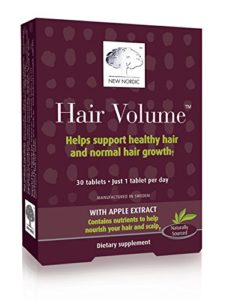
New Nordic Hair Volume is a vitamin and mineral-focused supplement that’s got a good dosage of the most important ingredients for hair growth, plus a few extra trace mineral and herbal extracts that could also help hair become stronger and fuller.
It’s a good call if you want more than just the basics but don’t want to overcomplicate things with a large number of possibly untested ingredients.
4. Naturenetics HairAnew
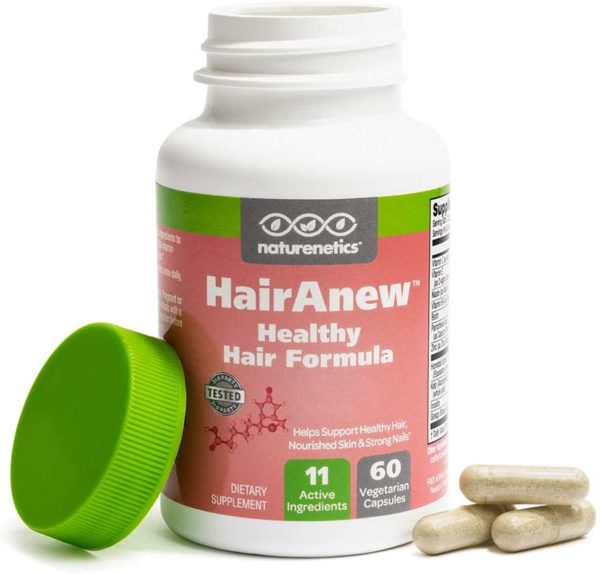
Naturenetics HairAnew is a hair growth supplement that’s focused around biotin, but delivers a a range of other vitamins and herbal extracts to help with hair health as well.
These include B vitamins, pantothenic acid, kelp, ginkgo biloba, and bamboo extract. These additional ingredients are useful, and moreover, there aren’t so many that the supplement gets bloated with extras.
5. Sports Research High Potency Biotin
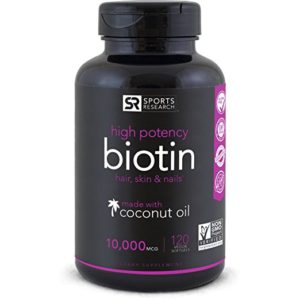
If you want to keep your supplementation routine simple and stick with only the most proven hair vitamin, Sports Research High Potency Biotin is the way to go.
While the only directly beneficial ingredients are biotin and coconut oil, the very high biotin dosage can do a lot of work on its own to improve hair growth. Other supplements offer a wider variety of ingredients, but biotin is certainly the supplement with the largest amount of scientific evidence supporting its use.
6. Brock Beauty Hairfinity
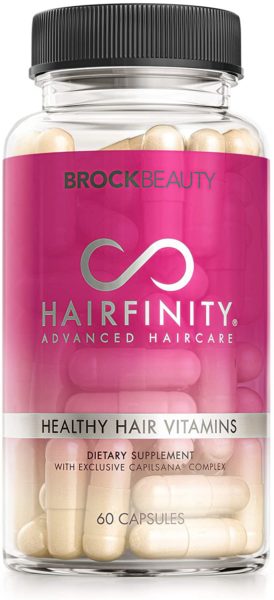
Brock Beauty Hairfinity provides a nice balance between vitamins and minerals for hair growth as well as additional ingredients for stronger hair, like keratin, collagen, and horsetail extract.
These extras are solid, though they don’t’ provide quite the variety as some other hair supplements. Still, this supplement should deliver all the critical ingredients your body needs to grow strong and healthy hair.
7. Tress Luminous Hair Vitamins 4 in 1
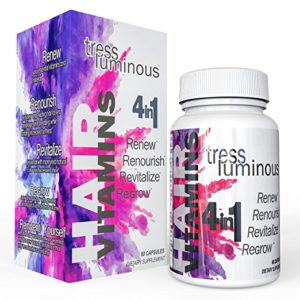
Tress Luminous uses both vitamins and herbal ingredients to boost hair growth. There’s a solid range of ingredients, but the major drawback is that the dosage of the key vitamins and minerals, like biotin and the B vitamins, is somewhat lacking.
On top of that, the per-capsule dosage of the herbal extracts is middle of the road, so they may not be able to make as big of a difference as you’d hope for.
8. SugarBearHair Hair Vitamins
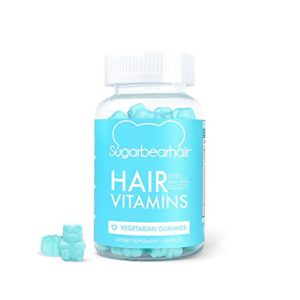
SugarBearHair makes a hair growth vitamin that provides only vitamin and mineral ingredients, without the herbal compounds found in other hair products.
However, the dosage of key ingredients like biotin and the B vitamins is lackluster compared to other products on the market, and some people may not like the artificial coloring agents and added sugar for flavoring.
9. Ultrax Labs Hair Rush
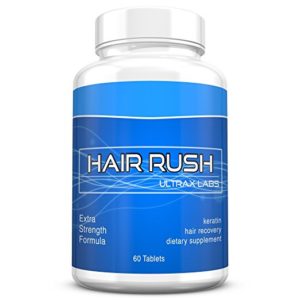
Hair Rush by Ultrax Labs is a hair growth supplement that delivers a small amount of vitamins, but is mostly focused on herbal ingredients.
Their proprietary hair growth blend includes nearly a dozen different ingredients, but the overall dosage is fairly low—the entire proprietary blend totals less than 150 mg per capsule, which makes it very hard to get a large dosage of just about anything in the proprietary blend.
10. Nature’s Bounty Hair, Skin, & Nails Gummies
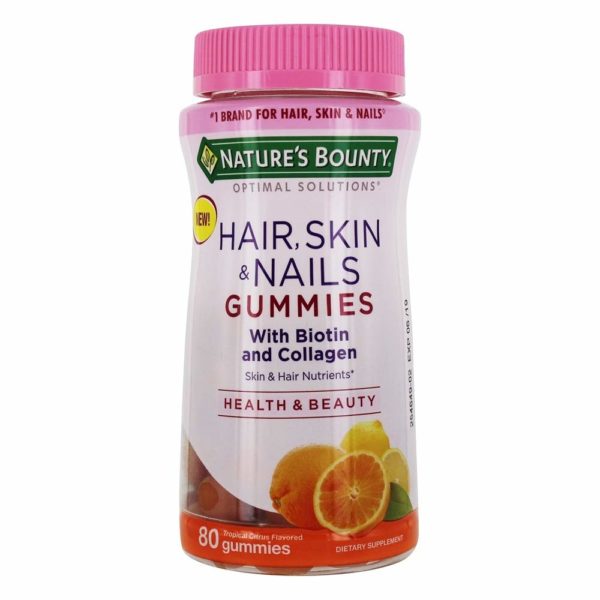
Nature’s Bounty Hair, Skin, & Nails Gummies provides all the basic vitamins and minerals you’d expect to see in a vitamin for hair growth.
Unfortunately, the gummy formulation clogs up the formulation with sweetening and flavoring agents that aren’t in the top-tier vitamins for hair growth. It’s not a bad option if you don’t like capsules, though.
Category winners
Best overall vitamin for hair growth: Essential Elements Hair Hero
Essential Elements is a great all-around choice thanks to its inclusion of the most important supplements for supporting healthy hair, like biotin, horsetail, and bamboo stem and leaf extract for extra silica. These give your body all the building blocks it needs for thick and healthy hair.
Best vitamin for hair growth for women: Hair La Vie Clinical Formula
Hair La Vie is perfect for women with long hair who want to pump up the volume, thickness, and strength of their hair follicles. It provides critical ingredients like vitamin D, reishi mushroom, and biotin to make your hair follicles stronger and more robust, even when you grow your hair out long.
Best vitamin for hair growth for men: Essential Elements Hair Hero
For men, the biggest concerns for hair are increasing thickness and preventing hair loss. Essential Elements is the best supplement on these fronts, thanks to ingredients like collagen, vitamin K, and saw palmetto extract that help your body produce strong, thick hair follicles.
Best vitamin for brittle hair: Essential Elements Hair Hero
Hair brittleness can be caused by oxidative damage, or by a lack of nutrients needed to build strong hair. Either way, Essential Elements has your back, with vitamin K, biotin, silica from bamboo, and other ingredients that augment your body’s hair synthesis capabilities.
Best vitamin for long hair: Hair La Vie Clinical Formula
Hair La Vie really shines when it comes to long hair, thanks to compounds like vitamin D3, reishi mushroom, and flaxseed, which give your body protection from oxidative damage, helping you support long hair that doesn’t lose volume or dry out over time.
Best vitamin for hair and nail growth: Brock Beauty Hairfinity
Believe it or not, hair and nails are made up of largely the same proteins. Brock Beauty Hairfinity takes advantage of this fact to supply biotin, keratin, collagen, and other nutrients that are beneficial both for hair and nails, making it our recommendation for a multi-purpose supplement.
Who should buy vitamins for hair growth?
If your hair is thin, lifeless, or brittle, you might be in need of a vitamin for hair growth. Both men and women alike can suffer from hair loss, hair brittleness, or poor hair strength as a result of dietary deficiencies that lead to degradation in hair quality, volume, and rate of growth.
While you could inspect your dietary micronutrient contents and try to tease out what’s missing, sometimes it’s just easier to take a vitamin for hair growth. A supplement designed specifically to include vitamins like biotin, B complex vitamins, iron, zinc, and copper can help address the most common nutritional deficiencies that could be contributing to your lackluster hair.
If your hair is a big part of your appearance, a vitamin for hair growth is an easy way to make sure you have all of your bases covered when it comes to making sure you have the best hair possible. Older men (and women) who are starting to deal with hair loss can also benefit from a vitamin for hair growth.
However, it’s important to emphasize the fact that a vitamin for hair growth is not a replacement for a hair loss treatment. A supplement that provides vitamins for hair growth can provide your body with the building blocks it needs to produce strong and high quality hair, but it won’t address the underlying hormonal factors that cause hair loss in the first place.
For that, you need a high-quality hair loss treatment like finasteride or minoxidil (or better, both at the same time). However, once you’ve got that taken care of, a vitamin for hair loss can ensure that your body has everything it needs to make sure the hair you do grow is strong and healthy.
How we ranked
To formulate our rankings of the top hair growth vitamins on the market, we started from the science of hair growth itself. We reviewed the relevant scientific literature to create a list of different vitamins and minerals that have been found to improve hair growth, hair strength, or hair retention.
This list included heavy hitters like biotin, B complex vitamins, and trace minerals like zinc, iron, and copper. All of these compounds had at least one study that supported their ability to improve the quality and health of your hair.
From this list, we started going through supplements on the market that claimed to promote hair growth. Ones that didn’t contain anything that had some proof behind its efficacy got eliminated.
Supplements with a greater number of potentially active ingredients, and supplements that delivered these ingredients at higher and more effective doses, scored the best.
Herbal or alternative supplement ingredients, like ginkgo biloba, oyster extract, and kelp (which provides iodine) marginally influenced a supplement’s place in the overall rankings, but by far the biggest factor was the content and dose of vitamins and minerals known to be associated with hair growth and hair health.
Beyond just the active ingredients, we also paid attention to supplement purity and clean design. Some supplements try to package hair growth vitamins into gummies, chewable tablets, or other nonstandard delivery methods, but these ended up getting ranked lower or being eliminated completely.
That’s because capsules are the simplest and cleanest way to deliver a vitamin for hair growth. Gummies and chewable tablets require coloring, flavoring, binding agents, and stabilizers, all of which add bloat and bulk to the supplement without doing anything for its efficacy.
Our final ranking scores emphasized effective ingredients for hair growth, while also taking into consideration supplement purity and design. On balance, our team feels these are the best options out there if you are looking to grow stronger and healthier hair.
Benefits
The right supplement can deliver the vitamins, minerals, and other ingredients your body needs to make hair that is strong, healthy, and fast-growing. There are a number of key vitamins your body needs for creating healthy and robust hair follicles, including biotin, the B vitamins, and several trace minerals.
In addition, there are some herbal extracts that may help increase either your rate of hair growth or the strength and thickness of the hair that you do grow.
Biotin is a good bet for maintaining healthy, strong hair. A review article by D.H. Rushton at the University of Portsmouth in the United Kingdom reviewed a number of nutritional factors that contribute to hair health and hair loss (1).
One of the key vitamins that Rushton identified for preventing hair loss is biotin: in experimental studies, biotin deficiency is reliably known to induce hair loss.
While further research is needed on the effects of biotin on hair health, some research has supported its role in growing thicker and stronger hair.
The Office of Dietary Supplements at the National Institutes of Health cites a number of small studies that found benefits to biotin supplementation in children with damaged hair, though there is less evidence for the effects of biotin in adults (2).
However, does not appear to be toxic even at high doses, so a cost-benefit analysis makes biotin look pretty favorable when it comes to hair health.
A good hair supplement will include iron to prevent hair loss. Iron deficiency is quite common even in developed countries, and there is a lot of scientific evidence that low iron levels can cause hair loss.
Research published in 2006 in the Journal of the American Academy of Dermatology by researchers at the Cleveland Clinic showed a direct link between iron deficiency and hair loss, both in men and women (3).
According to the authors, as well as other scientific studies that they cite, a decrease in blood levels of iron affects the body’s ability to maintain healthy hair follicles, and thus they die off and fall out.
At the Cleveland Clinic, all patients with diffuse hair loss are screened for iron deficiency, so it makes sense that a good vitamin for hair growth would include iron.
B vitamins are lower in people with hair loss. A scientific review article in 2017 in the American Journal of Clinical Dermatology by researchers at Brown University cited a number of studies that compared blood levels of micronutrients in people with hair loss versus people with healthy hair (4).
These studies found lower levels of folate and vitamin B12, suggesting that they are very important for maintaining healthy hair.
Research published in the Journal of Dermatological Treatment also supports the use of B vitamins to boost hair health and growth (5).
According to the researchers, several B vitamins are linked to hair health Biotin (vitamin B3) can enhance blood flow to the scalp and reduce cholesterol levels, which in turn reduces the level of alpha-5-reductase, an enzyme that’s linked to hair loss.
Other B vitamins prevent damage to the scalp from free radicals, and decrease accumulation of cholesterol in the scalp. All of these lead to stronger hair follicles, and in turn, stronger, healthier hair that is less likely to fall out.
The trace elements zinc and copper could be linked to hair health as well. The same study cited a couple of studies which also found that higher levels of zinc and copper, which are trace elements that can be found in many hair supplements, were associated with less hair loss, though not all studies came to this conclusion.
Pantothenic acid could help support hair texture. Back in 1946, a British doctor noticed that malnourished people with a deficiency in pantothenic acid had particularly poor hair health (6).
Not only were the affected people losing hair; their natural hair curl had disappeared. This suggested that pantothenic acid plays a role in creating hair that is strong and maintains its natural curls or waves.
If your hair is looking flatter than usual, and especially if you notice that you are losing hair as well, you might be low in pantothenic acid.
A diet with protein intake that is too low can cause weak and discolored hair. Hair is made of keratin, which is a type of protein. As you might guess, biological proteins in your body are ultimately made up of the amino acids that are in nutritional protein, in the macronutrient sense.
While it’s rare, diets that are very low in protein can lead to weak and brittle hair, discolored hair, and hair loss, according to a 2017 scientific review in the journal Dermatology Practical and Conceptual (7).
People who are on vegan or dairy-free diets, for example, are more likely to end up with hair problems that result from insufficient protein intake. In this case, you’ll to make dietary modifications or use a vegan protein powder to up your amino acid intake and improve your hair health.
Low vitamin D levels could increase your risk for hair loss. We’ve already covered the important link between iron and hair health, but some interesting research published in 2013 in the journal Skin Pharmacology and Physiology has proposed a link between vitamin D and hair loss too (8).
The study, which was conducted on 80 women age 18 to 45 who had hair loss looked at several biomarkers and compared them to healthy controls with no hair loss. Ferritin levels (a transporter protein for iron) were low, which lines up with what we know about iron intake and hair health.
However, vitamin D was also much lower in the women with hair loss than the healthy women. Vitamin D shows up almost everywhere in health, whether it’s risk for chronic disease or physical performance, so we perhaps should not be too surprised to see vitamin D linked to hair loss.
Earlier, we differentiated nutritional factors that are related to hair growth from hormonal factors that affect hair growth, but vitamin D may be an exception to this dichotomy.
That’s because vitamin D is a hormone, albeit an unusual one. Since vitamin D levels are connected to so many other areas of health as well, addressing any possible vitamin D deficiency in a supplementation program for hair growth and hair health is a great idea.
Side effects
Fortunately, many of the key ingredients in a good hair growth vitamin are not known to cause harm, even at high doses.
Biotin, for example, is not known to cause health problems, even at doses of up to 200 mg per day (9).The same is true for pantothenic acid, another mediator of hair growth and health (10).
Zinc and iron, two trace elements important for hair growth, do have negative effects at high doses. Iron can be particularly problematic in people with a condition called hemochromatosis, which affects about one in 200 people in the United States.
In these people, excessive iron intake can cause serious health problems, because their body allows iron to accumulate and cause tissue damage.
With supplements that employ a large number of herbal extracts, side effects are harder to predict.
Some users of hair growth supplements with length lists of herbal ingredients have complained of headaches, stomach cramps, and breakouts of acne on their skin, but it’s hard to trace which herbal extract could be linked to these symptoms.
Recommended dose
With no direct clinical trials measuring the effects of vitamins for hair growth, it is difficult to determine precise dosing guidelines.
Biotin and pantothenic acid can be taken at several times their recommended daily intake, and intake should likely be high if you think you have a deficiency that is affecting your hair.
The same goes for other B vitamins, which is why you’ll find high doses of these nutrients in many high-quality hair growth supplements. In the case of trace minerals like zinc and iron, your supplement should not exceed 45 mg for iron or 40 mg for zinc.
Beyond these intakes, adverse health effects can occur, so be sure to stick below these thresholds unless you’re under a doctor’s orders.
FAQ
Q: Are there vitamins for hair growth without biotin?
A: A hair growth vitamin supplement without biotin is quite difficult to find, because biotin is one of the very best supplemental ingredients for hair growth. Every single supplement in our rankings of the best vitamins for hair growth, for example, have biotin in them.
It’s hard to find a good rationale for excluding biotin from a hair supplement, because 1) it is a very important supplement for hair growth and 2) it’s extremely safe, with no known side effects even at quite high doses.
You could make yourself a “custom” hair growth vitamin routine that uses only other B vitamins and trace minerals like zinc, copper, and iron to get some hair growth benefits without taking biotin, but our team strongly recommends including biotin in your hair growth supplementation routine because of its efficacy and its safety.
Q: Are there vitamins that work for both hair growth and nail growth?
A: Yes, in fact most hair growth vitamins work as vitamins for nail growth as well. That’s because keratin, the protein that makes up hair, is exactly the same as the protein that makes up nails.
People with fragile, brittle nails often find they have the same sorts of problems with their hair; likewise, vitamins that help strengthen and improve the growth of your hair are likely to do the same for your nails.
There are some exceptions, like treatments that work on the hormonal side of hair loss: finasteride and minoxidil, for example, won’t do anything for your nails. However, that’s because they’re working to change the hormonal profile that your hair follicles encounter; they aren’t supplying the building blocks your body needs to make keratin.
Q: What is the best vitamin for hair growth?
A: It’s hard to pick just one, but there’s a strong case to be made for biotin. Biotin deficiency is known to create hair damage, which can be reversed with biotin supplementation. Biotin is also quite safe; unlike other potential hair loss vitamins like iron, there are no known harmful effects that come with taking too much biotin.
Given the known biological connection between biotin and the production of keratin (the main protein in hair and nails), and the exceedingly good safety of biotin as a supplement, biotin is a good bet for the best individual vitamin for hair growth.
Q: What is the best vitamin for hair loss?
A: As with vitamins for hair growth, ingredients tend to work better in conjunction with others, though again there’s a good case to be made for biotin.
For hair loss specifically, though, before you even consider taking a vitamin, you should make sure you’ve addressed the underlying hormonal causes that lead to hair loss. In other words, use a top-ranked hair loss treatment.
Once you’re on a treatment like finasteride or minoxidil foam, then you can think about biotin-based vitamins for improving the health of the hair you’re regrowing.
Q: What pills help with hair growth?
A: The best pills for hair growth are supplements that provide multiple independent vitamins and minerals that help support hair growth.
Our top-rated vitamins for hair growth do exactly this: products like Zhou Hairfluence and HairAnew provide a range of B vitamins, including biotin, as well as multiple trace elements that contribute to hair growth and hair health.
These are your best bet, as opposed to single-ingredient products or hair supplements that don’t provide any ingredients with scientific evidence supporting their inclusion in a hair loss supplement.
Q: Can vitamins make your hair grow faster?
A: Direct evidence that vitamins can actually speed the rate of hair growth is scant. For one thing, it’s hard to measure the rate of hair growth precisely, and for another, any effect of a vitamin is going to be quite small compared to the natural variability in hair growth from person to person.
It does seem to be the case that deficiencies in some vitamins and minerals, particularly B-complex vitamins, and the trace metals zinc, copper, and iron, are associated with hair loss and low-quality hair (i.e. brittle or dry hair follicles).
Instead of worrying about speeding up the rate of hair growth, it’s better to focus on making sure the hair you do grow is thick, strong, and healthy.
Q: What food is good for hair growth?
A: Good foods for hair include foods rich in biotin and other B vitamins, as well as iron, copper, and zinc. These foods include eggs, almonds, cheese, mushrooms, spinach, red meat (go for grass-fed red meat for the higher CLA content), and legumes, including beans and lentils.
A hair-healthy diet is bound to be a diet that’s healthy for you overall, because these foods are great sources of plenty of other vitamins and minerals in addition to just the ones that matter for hair growth.
Q: How long does it take for vitamins for hair growth to start working?
A: The biological effects of the vitamins in a hair growth supplement should accumulate to maximum levels in your body within a few days at most. However, it could take much longer for you to actually feel the results in your hair.
That’s because hair strength is largely determined at the roots: no vitamin, no matter how powerful, can affect your hair strands out beyond the roots of your hair. To do that, you’ll need special shampoos and oils like coconut oil to hydrate and strengthen your hair.
Q: Why is biotin important for hair growth?
A: Biotin is one of the most important vitamins for hair growth because it is known to play a role in the synthesis of healthy hair and nails. People who are deficient in biotin reliably develop brittle hair and brittle nails, and these symptoms disappear once biotin levels are corrected.
Moreover, among women who complain of hair loss, almost 40% have biotin deficiency according to one study (11). The precise mechanism is unclear, but likely has to do with biotin’s role in the synthesis of important enzymes for hair production.
Related articles
Recap
Several vitamins and minerals play a role in hair growth and hair health. Deficiencies in biotin, pantothenic acid, and trace minerals like zinc, copper, and iron are linked to hair loss and loss of your hair’s natural waves and curls.
Taking a supplement that includes vitamins for hair growth can prevent these deficiencies; moreover, they might even help your hair become healthier than before.
While evidence to date is circumstantial, a supplement that provides these key hair nutrients could be the gateway to stronger, thicker, and healthier hair.
For BodyNutrition’s #1 vitamin for hair growth recommendation, click here.